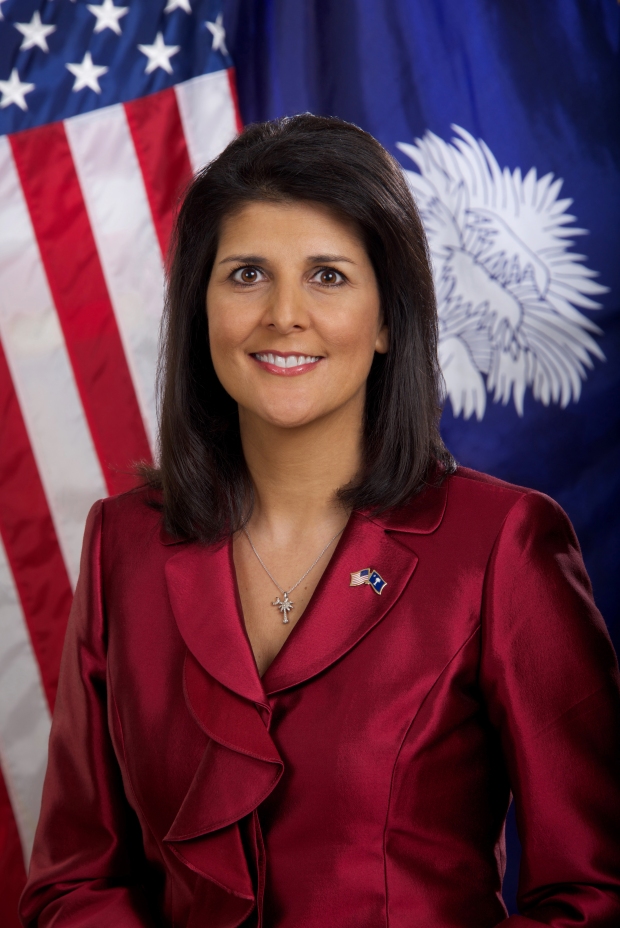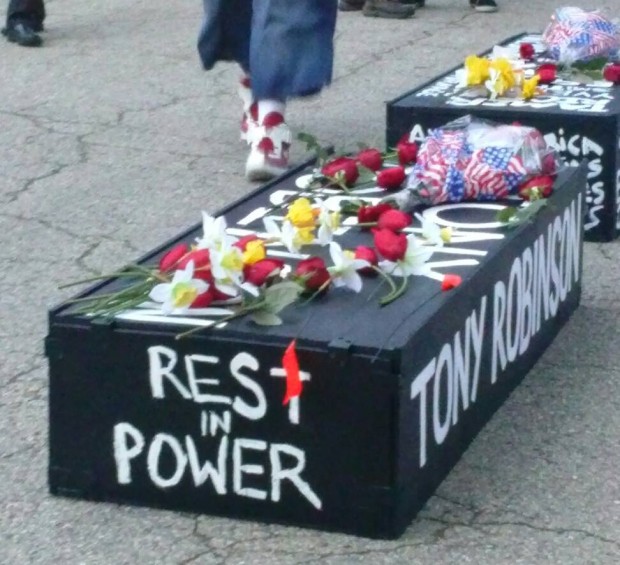It’s been one month since Dylann Roof entered Mother Emanuel AME in South Carolina and gunned down 9 Black people: Rev. Clementa Pinckney, Rev. Sharonda Coleman-Singleton, Cynthia Hurd, Tywanza Sanders, Ethel Lance, Susie Jackson, Daniel Simmons, Myra Thompson, and Minister DePayne Middleton.
This time, we don’t get to just blame white people.
Asian American responses to the massacre have focused on Dylann Roof’s strange willingness to ally with “Northeast Asians.” But that’s not the only role Asian Americans played in this shooting. Dylann Roof was, unsurprisingly, a white male mass murderer. However, his state, complete with a Confederate flag flying over the state capitol until July 10th, is governed by a South Asian woman. Though she’s not “Northeast Asian” (whatever that means) Nikki Haley plays exactly the role that Dylann Roof glorified – acting as “an ally to the white race” to uphold white supremacy. Despite her claims to whiteness, Nikki Haley is in fact one of us. This time, we can’t just point a finger at white people – we need to grapple with where and how whiteness lives in us, too.
Nikki Haley has been vocal about her intensely anti-immigrant, anti-labor, anti-choice, and anti-affirmative action stances. Along with her conservative politics, Haley is best known in South Asian circles for her claims to whiteness: changing her name from ‘Nimrata’ to ‘Nikki’ and filling out ‘W’ for white on a voter registration form. For a while, she was seen as the Republican party’s next shining star – along with Bobby Jindal, another South Asian politician willing to put a brown face onto a white politic.
Apparently, Haley’s claims to whiteness have fooled us, too. In the many statements written from South Asian, Asian American and API organizations, few have claimed Nikki Haley as one of our own. Clearly, we’re in no rush to assign ourselves any portion of blame for yet another act of domestic terrorism. And yet, we’re in a particular moment where the politics of racial identity are being loudly questioned, with whiteness confusingly claiming people of color space. Controversies around racial identity have entered our Facebook feeds and the mainstream news cycle, with Rachel Dolezal’s duplicity exposed and Andrea Smith’s authenticity questioned. As South Asians, especially non-Black South Asians, we must grapple with the opposite problem – how to respond when our people choose whiteness, and identify as such.
South Asians in the U.S. have attempted to beat Americans at their own racial game since our people first set foot in this country. In the late 1800s, South Asian merchants played up their own ‘exoticism’ – of themselves and their wares, knowing that exotic was safer than threatening, and that mysticism could sell goods. In 1923, Bhagat Singh Thind laid a legal claim to whiteness, claiming that he was a descendant of the ‘Aryan’ and ‘Caucasian’ race, and therefore should be eligible for citizenship. The court ruled that Thind was indeed Caucasian, but was not white – and therefore not fit to be a U.S. citizen.
Almost a century later, Nikki Haley also claims whiteness. Passing has often been about safety and access; this, on the other hand, is about oppression, a willingness to throw people of color – including many South Asians – under the bus in order to gain power. In a world of identity politics that are all about self-identification, there are in fact moments when we get to override. We don’t get to evade responsibility for Nikki Haley because she claims not to be one of us. We don’t get to sigh in relief and say, “See, she’s white. Just let her be white.” In many ways, Nikki Haley – and our other favorite South Asian, Tanned Rested & Ready Bobby Jindal – are the epitome of what it means to be upper middle-class and South Asian.
The irony, of course, is that Haley grew up in a Sikh family. Just 3 years ago, with eerily similar overtones to the SC shooting, a white supremacist murdered 6 people in a gurudwara in Oak Creek, WI. Haley must have some understanding of the impact of race-based hatred coded as religious violence. This is the racial logic of much of South Asian America – despite the violence, claiming whiteness is understood as more politically expedient.
How do South Asians – especially those of us who are light-skinned, upper middle class, upper caste, colonized – access whiteness without passing? Are we yet again claiming to be ‘Caucasian’ even as we are not white?
Haley doesn’t pass – her ‘ethnic’ Sikh heritage is predictably paraded out every election cycle – but she certainly does utilize whiteness. Her own claimed proximity to whiteness- including her name change and her policies- has created her political career. Our ability to access whiteness is dependent on many factors – skin color, class, caste, education, access, location, and more. And yet even for those of us who are mistaken for Black and experience anti-Black violence – including from within our own communities – there is still always someone below us on the racial hierarchy. South Asians in the U.S. are consistently asked to play the middleman. We are offered a deal: if we appropriately play our role as “allies of the white race,” we will be spared the brunt of anti-Black racism, even as we experience the sometimes devastating aftershocks.
In the wake of Trayvon Martin’s murder in 2012, young Black people powerfully responded by saying “I am Trayvon Martin.” Here in Madison, just a few months ago, a teenager named Tony Robinson was shot 7 times by a police officer. When young people take the streets here, they often chant: “I am Tony Robinson. You are Tony Robinson. We are Tony Robinson.” As much as I organize and stand in solidarity with them, and as much as I understand that my liberation is tied with theirs, I can never join this chant.
Because the truth is – I am not Tony Robinson. I am not Trayvon Martin. But I am also not Darren Wilson, the white officer who shot Mike Brown.
I am Nikki Haley, and my racism too is damaging.
I have believed the racist lies fed to me in this country: that I should fear Black people, blame them for their own poverty. I have made the choice to let anti-Black racism fester, claiming that it’s too hard to challenge now, that I’m exhausted today, that I’ll get to that later. I have succumbed to anti-Blackness even while being directly impacted by racism. By being South Asian in America, anti-Black racism is built into every institution I participate in; and I have the privilege to not always challenge it. As Nikki Haley shows us, this form of violence is just as deadly. She, too, is responsible for the 9 lives lost one month ago.
America is in a state of crisis. Our refusal to claim Haley as our own, to acknowledge that she embodies our own simultaneous engagement with and denial of racism – that refusal has the power to kill. We need to claim Nikki Haley, and Tanned Rested & Ready Bobby Jindal, whether or not they claim us. They are not only part of our community; they exemplify the parts of our communities that we would rather hide.
They, unfortunately, are not an aberration. They show us what being South Asian in America can mean. As early as 2001, before the events of 9/11 showed South Asians that our whiteness was indeed conditional, Vijay Prashad called for “model minority suicide.” South Asians have been mutinying for well over a decade. It’s up to us to have these conversations in our communities, to acknowledge and make visible the deep racism that still exists, and to choose resistance.




While Governor Haley is by no means perfect, and is deserving of almost all of the criticism in this piece the article is still very misleading, and personally I find its omissions and implicit logic offensive. While the article never outright states it, the title all but calls Governor Haley a white supremacist, and that is a dangerous conflation of overt, Dylann Roof-like racism and the far more subtle complacency that this article is actually talking about.
More ridiculous, however, is that in an article that is in many ways about the Dylann Roof shooting, the total lack of any mention of the governor’s reaction to the tragedy is completely inexcusable. Governor Haley deserves a huge amount of credit for the eventual removal of the very confederate flag that this article mentions, turning another mass-shooting tragedy into a call to action. While that call was limited in scope, it was far more than the other mass shooting of recent years have inspired.
It would not be difficult to mention the role Governor Haley played there and then dismiss it as far too little too late, but to not even mention it is shoddy writing at best and actively dishonest at worst.
Nikki Haley put ‘white’ down as there is usually no option for people from Indian subcontinent on census forms. Asian usually means oriental. I have had two speeding tickets and in both instances the Policeman wrote down my race as ‘white. If you go search criminal registry, most North Indians are classified as ‘white’ or other. Considering most North Indians are classified as Caucasians, writing ‘white’ is perfectly understandable. It would be another thing if South Carolina census had a people from indian sub continent category and Nikki put down ‘white.’ In this case the author is being lazy and twisting facts to suit her narrative.
Reblogged this on The inconvenient Truths .
This article is a bit strange…in attempting to advance a progressive racial dialogue, I feel that it almost regresses the discussion. The notion that an ethnic group must “claim” a fellow ethnic member is a disconcerting one. It advances an idea that racists often use to defend their ideals—that members of an ethnic or racial group are responsible for their fellow group members. This reminds me of Rupert Murdoch’s tweets a while ago, on how all Muslims have to answer for the behavior of a few.
Racial boundaries and expressions of identity can be extremely fluid, and obviously comprise far more than simply one’s ethnicity. Reducing this to an ethnic dimension seems misguided and ironically backwards. I agree that the pressures and motivations of Indian-Americans and other “ethnic” Americans to present themselves as white is a topic that requires deeper exploring, but this isn’t the way to do it. The framing of this in terms of the South Carolina shootings seems, at least as it’s presented here, a bit disconnected and insensitive.
This is an interesting post, and I’d be really interested to hear your thoughts on my response, whether you think I’m coming at this from a wrong place, etc. Thank you for writing this thought-provoking piece.
I agree with the sentiment that framing this argument in terms of “ethnicity” is possibly not the most apt description of the process that Sasha wishes to describe, but I think her point still stands if we change the terms around a little. I think if she referred to a racialization of South Asians as being the cause of this internalized anti-blackness it will clear up the confusion between attributing an ethnicity to certain inherent givens stemming from that identity to one about adopting a certain frame of reference based on how someone else has racialized you through a method of visualization (i.e. as a person who is raced, you don’t understand that you are raced yourself until someone else points it out to you, usually based on visual standards associated with said race).
The most important point that I glean from the essay is the way in which it points to the difficulty in describing and eradicating the often invisible way in which internalizations play out. In “claiming” Nikki Haley, Sasha doesn’t ask us to take responsibility for this one figure, but take responsibility for the fact that sentiments that Nikki Haley produces could also be present in ourselves. Further, the point to be made is the fact that understanding that the actions and thoughts of Nikki Haley are wrong doesn’t automatically mean we are able to rid ourselves of these same sentiments in our own actions. What Sasha in the end urges us to do is to actively observe our position and work with intention to act differently to eradicate these unconscious way in which these internalizations play out.
I also put white on my voter registration form. I immigrated from Kerala,India to McAllen,Texas. I have Bobby Jindhal’s skin color. But most Indians are Caucasian. Remember just because you are Caucasian doesn’t mean you have to be lily white.
Thank you for this. Reading the comments reminds me how difficult it is to speak to other South Asian folx about our complicity in white supremacy and our nuanced position in the racial schema of the United States. It’s often so difficult and so isolating to fight that fight within the community, and I’m so grateful for pieces like this that remind me that we’re not in it alone.
The question is does:Governor Nikki Haley represent the best interests of Asian Americans or is she the Asian American equivalent of an “Uncle Tom”( what Hispanics would call a “Tio Taco” or the Irish a “shoneen”)?